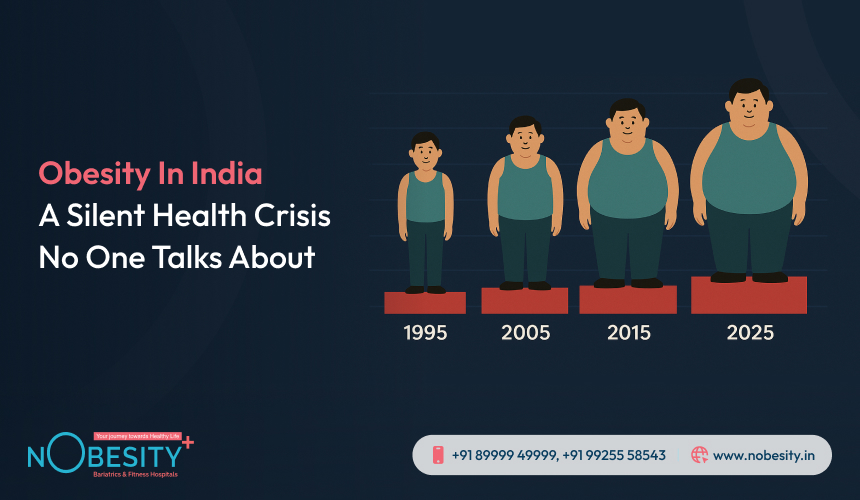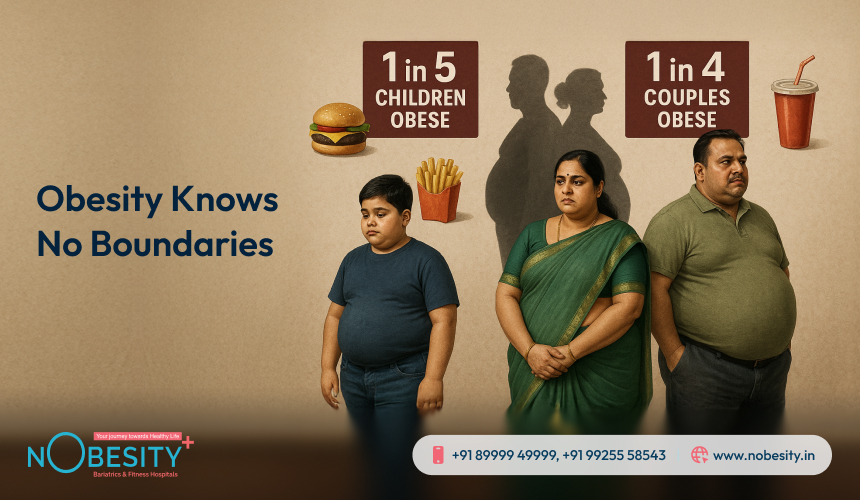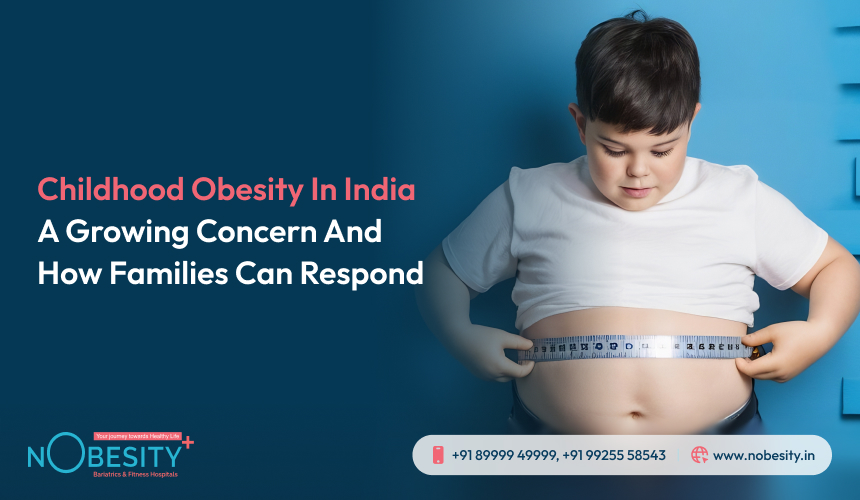
India is facing a growing obesity crisis, particularly among its younger population, with alarming statistics that demand immediate attention. According to a 2022 global analysis published by a world-leading general medical journal, a staggering 12.5 million children aged between 5 and 19 in India were found to be severely overweight, a significant rise from just 0.4 million in 1990. This sharp increase highlights the alarming rise of childhood obesity, with 7.3 million boys and 5.2 million girls now struggling with excessive weight.
Obesity, as defined by the World Health Organization (WHO), refers to the abnormal accumulation of fat that presents serious health risks. The WHO defines overweight as a BMI over 25 and obesity as a BMI over 30. The growing number of obese individuals, particularly among children and adults, underscores the urgent need for preventive measures and intervention to curb the escalation of this health crisis.
In India, the number of obese adults has also soared dramatically. The study revealed that 44 million women and 26 million men over the age of 20 are now obese, up sharply from 2.4 million women and 1.1 million men in 1990. Furthermore, more than 3% of children and teenagers in India are now obese, marking an increase of over three percentage points since 1990. These figures highlight the country’s urgent health challenge, with significant implications for healthcare systems and future generations.
With these troubling statistics, the need for targeted public health policies and practical interventions has never been more critical in combating the obesity epidemic in India. As we explore the causes behind this alarming rise in obesity, it becomes clear that lifestyle changes, dietary shifts, and socio-economic factors all play pivotal roles. Understanding these underlying causes is the first step in addressing this health crisis and finding sustainable solutions for the future.
The Silent Crisis: Understanding Obesity in India
Obesity in India has become a growing public health crisis, one that has largely been overlooked despite its profound implications. The focus often remains on basic solutions like diet and exercise, which are vital but may not be enough for those with severe obesity. This is where medical interventions, particularly bariatric surgery, play a crucial role. Bariatric surgery has proven to be an effective option for individuals struggling with extreme obesity, helping them achieve sustainable weight loss and improve health outcomes.
While there is an increasing awareness about obesity, many still view it as a matter of personal choice or lifestyle. However, obesity is a chronic disease that requires a deeper understanding. Its effects go beyond weight gain, significantly affecting physical and mental well-being.
To understand how obesity contributes to these chronic diseases, here’s a snapshot of some significant health issues tied to obesity:
| Chronic Disease | Impact on Health | Obesity Connection |
| Type 2 Diabetes | Increased blood sugar levels lead to organ damage and an increased risk of heart disease. | Excess body fat leads to insulin resistance, causing Type 2 diabetes. |
| Heart Diseases | Higher risk of heart attacks, strokes, and clogged arteries | Obesity increases the workload on the heart and can lead to cholesterol imbalance. |
| Hypertension | Strain on the heart, risk of kidney disease, and vision problems. | Obesity causes high blood pressure due to the excess weight on the body. |
Bariatric surgery has proven to be a safe and effective treatment for those whose obesity cannot be managed through traditional methods alone. It offers a long-term solution, significantly reducing the risks associated with obesity, such as diabetes, heart disease, and hypertension, while enhancing overall well-being.
To effectively address the obesity epidemic in India, it’s crucial to embrace a wide range of solutions, including medical interventions like bariatric surgery. Recognizing obesity as a serious health concern and offering comprehensive treatment options is the key to improving the nation’s health.
Key Factors Contributing to Obesity in India
The rise in obesity in India can be attributed to a mix of modern lifestyle changes, poor dietary habits, and certain genetic predispositions. While genetics may play a role, lifestyle shifts, especially in urban areas, drive this alarming trend.
Key Contributing Factors:
- Dietary Shifts: The increasing reliance on processed foods, fast food, and sugary beverages packed with excess calories and low nutritional value is a major contributor to obesity.
- Sedentary Lifestyle: With more time spent sitting at desks and increased screen time, physical activity has drastically reduced, leading to weight gain.
- Urbanization: Rapid urban development has brought about easier access to fast food and ready-to-eat meals, and a lack of time to cook nutritious, home-cooked meals.
- Lack of Physical Activity: Many urban and rural areas are experiencing a drop in outdoor activities and sports opportunities, contributing to the rise in sedentary behavior.
- Genetics: Genetic factors contribute, with some individuals predisposed to storing more fat, though lifestyle choices magnify these genetic risks.
Understanding and addressing these factors is crucial in combating obesity and reducing its associated health risks.
The Growing Threat: Childhood Obesity in India
Childhood obesity in India is rapidly becoming a public health concern that demands immediate attention. Here are the key factors contributing to this growing issue:
- Dietary Changes: The rise in the consumption of processed foods, sugary drinks, and fast foods has led to poor eating habits among children, significantly contributing to weight gain.
- Sedentary Lifestyles: With increased screen time and a decline in physical activity, children today are leading more sedentary lives, directly contributing to obesity.
- Urbanization and Convenience: Busy lifestyles and urban living have made it easier for children to access unhealthy food options while limiting outdoor opportunities.
- Health Risks: Childhood obesity is linked to serious health problems such as type 2 diabetes, heart disease, and hypertension—conditions that were once seen primarily in adults.
- Psychological Impact: Obesity also takes a toll on children’s mental health, leading to issues such as low self-esteem, anxiety, and bullying, all of which affect their emotional well-being.
Addressing childhood obesity requires a shift in both awareness and action. It’s time to take proactive steps to promote healthier lifestyles and ensure a healthier future for our children.
Obesity Surgery: A Life-Changing Solution
Bariatric surgery offers a transformative solution for those struggling with obesity. It helps in significant weight loss, improves overall health, boosts confidence, and provides a foundation for long-term success. Let’s take a closer look at the key benefits of this life-changing procedure.
Sustainable Weight Loss
For individuals battling obesity, traditional methods such as diet and exercise may not always provide long-term results. Bariatric surgery, however, offers sustainable weight loss by directly addressing the root causes of obesity.
- Reduces stomach size, leading to a decrease in food intake.
- Helps individuals feel fuller faster, reducing cravings and overeating.
- Studies show patients can lose up to 60-80% of excess weight within the first year.
- Results are maintained over the long term, ensuring lasting health improvements.
Health Improvements Beyond Weight Loss
Bariatric surgery doesn’t just aid in weight loss—it provides a wide range of health benefits that drastically improve the quality of life.
- Significant reduction in type 2 diabetes symptoms, with many patients going into remission.
- Improved blood pressure and cholesterol levels, reducing the risk of cardiovascular diseases.
- Bariatric surgery can be a life-saving intervention, preventing the onset of severe conditions like heart disease, stroke, and joint problems due to obesity.
Psychological and Emotional Boost
The benefits of bariatric surgery go beyond the physical. Obesity often takes a toll on mental and emotional health, leading to issues like low self-esteem, anxiety, and depression.
- Post-surgery, many patients report a significant boost in confidence and a better outlook on life.
- Improved social interactions as weight loss allows for a more active lifestyle.
- Renewed sense of self-worth, enabling individuals to enjoy life and relationships in new ways.
Long-Term Benefits for the Future
Bariatric surgery is not just a quick fix; it offers a long-term solution for those serious about transforming their health.
- The procedure provides a foundation for lasting weight loss and improved overall health.
- Adopting a healthier lifestyle, including balanced nutrition and exercise, is key to maintaining long-term results.
- Patients who follow post-surgery guidelines can reclaim control of their lives and feel healthier, more energetic, and more confident.
Bariatric surgery is a life-changing decision that empowers individuals to take control of their health. It’s a pathway to losing weight and improving mental and physical well-being. With lasting results, bariatric surgery offers the opportunity to lead a more fulfilling, healthier life free from the constraints of obesity.
How Bariatric Surgery Transforms Lives
Bariatric surgery has proven to be a life-changing solution for those struggling with severe obesity, offering a path to lasting weight loss and a healthier future. Regarding safe and effective weight loss surgery, NObesity stands out as a trusted leader in bariatric care, helping individuals like you regain control of their health and live life to the fullest. Explore real-life transformation success stories, such as Parth Tolia’s inspiring journey.
Parth’ Tolia’s story is a powerful testament to the impact bariatric surgery can have on someone’s life. At 255 kg, he faced daily struggles—unable to fit into chairs, climb stairs, or engage in activities with his twin children. His health was heavily affected by sleep apnea and a strong dependence on junk food and soft drinks.
After consulting with Dr. Manish Khaitan and the team at NObesity, Parth made the life-changing decision to undergo bariatric surgery. The results were remarkable—he lost 105 kg and completely transformed his life. Today, Parth enjoys a much-improved quality of life—he can now easily climb stairs, fit comfortably into chairs, and have the energy to engage with his children fully.
Parth’s transformation is more than just about weight loss; it’s about reclaiming his health, confidence, and future. If you’re ready to change, NObesity is here to support you every step of the way, just as we did for Parth. Explore more real-life stories of transformation and see how bariatric surgery has helped countless others reclaim their health and live a fulfilling life.
Conclusion
Obesity is not just a physical condition; it affects every aspect of a person’s life, from health to emotional well-being. While the causes are multifaceted, the solution lies in making lifestyle changes, adopting a balanced diet, staying active, and seeking professional support. With the proper guidance and determination, overcoming obesity is not just a dream—it’s an achievable reality.
For those looking to take the first step towards a healthier, more fulfilling life, NObesity provides expert care, support, and a clear path to lasting transformation. Your journey towards a healthier you begins with a single decision—let us be part of that journey.





